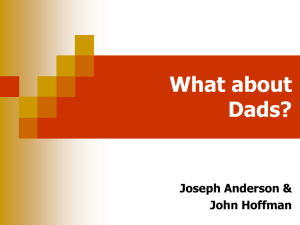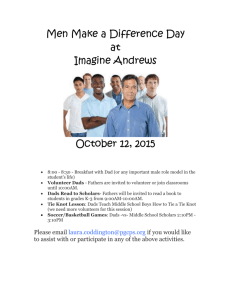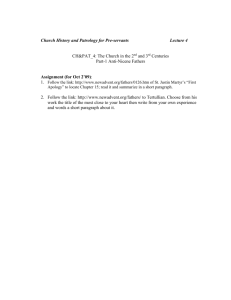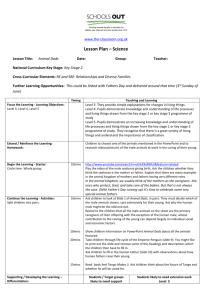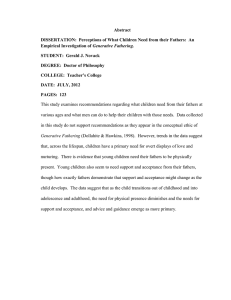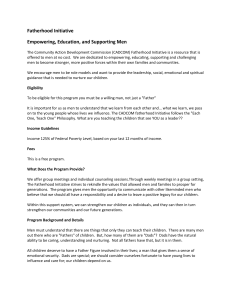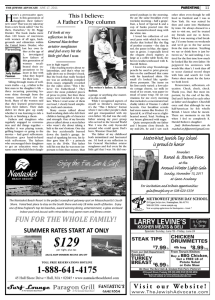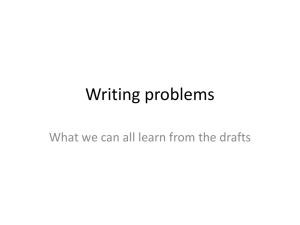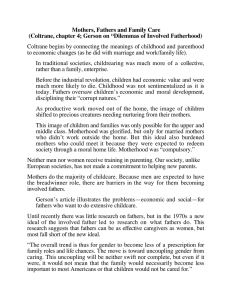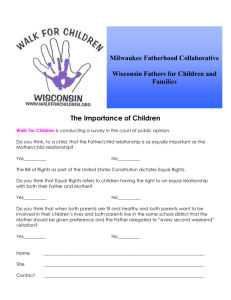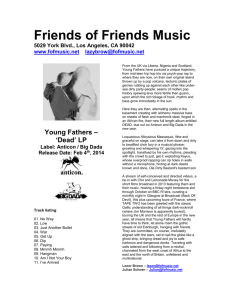What about Dads?
advertisement
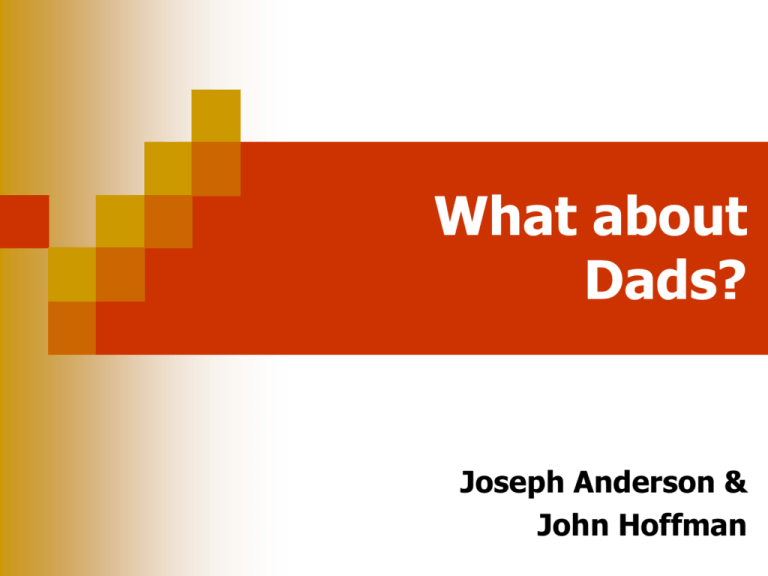
What about Dads? Joseph Anderson & John Hoffman What about Dads? Welcome Participants will listen to and engage in a dialogue with two fathers about their unique perspectives on what Early Intervention has meant for their families: Its Rewards, Challenges and Hopes In the early intervention system, home and community. What about Dads? Plus an opportunity to talk about the cultural aspects of recognizing the importance of fathers and the roles that they play within the family structure. Ground Rules Normal is only a cycle on a washing machine “The Quotable Dad” On Becoming a Father If you ever become a father, I think the strangest and strongest sensation of your life will be hearing for the first time the thin cry of your child. -LAFCADIO HEARN- A Hard Profession Like any father, I have moments when I wonder whether I belong to the children or they belong to me. -Bob Hope Insanity is hereditary; you can get it from your children. -Sam Levenson- Types of Fathers Biological Fathers Traditional Non Custodial Father Divorced. Nuclear Family. Has visitation rights or joint custody Father Figure Grandparents, Primary role model or live in boyfriend Incarcerated Father - Imprisonment ???????? Our Stories The beginning Birth’s and Diagnosis Medical response to our families (positive/negative) What was helpful or not. Expectations Obstacles This is how Hope started her journey into the world Love my smile? Family Centered supports and services All people need support and encouragement. All families have hopes, dreams and wishes for their children. All people have different but equally important skills, abilities and knowledge (strengths). Families are resourceful, but all families do not have equal access to resources. Families should be assisted in ways that help them maintain their dignity and hope. Families should be equal partners in the relationships with service providers. Providers work for families Lynda Cook Pletcher and Sue McBride 1998 This slide was edited by NECTAC due to copyrighted material it contained. It contained pictures, from a newspaper, of the Anderson family. Love My Smile? What about Natural Environments • • • • Natural Learning Opportunities Participation in families everyday activities, places and relationships IFSP as an going FAMILY document Integrated supports and services Location Activity Opportunities Adapted from Carol Trivette 1998 Location Activity Opportunity What is the Natural Learning Opportunity? WHAT YOU TEACH FROM BIRTH TO THREE IS WHAT WILL MATTER MOST TO ME Location Activity Opportunity Barriers/Stereotypes of Fathers Men are not sensitive to issues of Children. Majority of people working in the Early Childhood field are women. Poverty or working class mentality ( Looking at what roles the father plays -Nature vs. Nurture) Not believing in the importance of reaching out to the opposite sex. Men don’t take initiatives in their child/children's care. Moms are more accessible. Philosophy of Culture We must first understand our own culture, and the values and beliefs we have about others we see as different from ourselves. All families and individuals are unique – influenced, but not defined, by culture. Families and professionals must work together to find common ground in order to design services that meet the needs of children/families and show respect for families. (Mutual Respect and Honesty) Professional and parent partnerships are vital to increasing cultural competencies. Professionals have a responsibility for helping families to understand/interpret programs and services so that they can better advocate for their children. Culture Culture refers to a system of values, beliefs, attitudes, traditions and standards of behavior that govern the organization of people into social groups and regulate both group and individual behavior. Culture is created by groups of individuals to assure the survival and wellbeing of group members. Culture is learned and is more complex than either ethnicity or race. Institute for Human Services, Revised 2001 Culture Culture is an integrated pattern of human behavior which includes but is not limited to - thought, communication, languages, beliefs,values, practices, customs, courtesies, rituals, manners of interacting, roles, relationships, and expected behaviors of a racial, ethnic, religious or social group; the ability to transmit the above to succeeding generations; dynamic in nature. Institute for Human Services, Revised 2001 A model for Developing Cultural Sensitivity INTEGRATION ADAPTATION ACCEPTANCE MINIMIZATION DEFENSE DENIAL As a culturally competent individual, I am capable of interacting positively with people who do NOT believe like, live like act like, talk like, look like, ME!!! Source: Multnomah County Department of Health. think like, Developed by the NCCC, 2002 The Community of Man “All “men/women” are interdependent. Every nation is an heir of a vast treasury of ideas and labor to which both the living and the dead of all nations have contributed. Whether we realize it or not, each of us lives eternally ‘in the red.’ We are everlasting debtors to known and unknown men and women. When we arise in the morning, we go to the bathroom where we reach for a sponge which is provided for us by a Pacific islander. We reach for soap that is created for us by a European. Then at the table we drank coffee which is provided for us by a South American, or tea by a Chinese, or cocoa by a West African. Before we leave for our jobs we are already beholden to more than half of the world.” Martin Luther King, Jr. For further information Joseph Anderson (765) 254-9985 anderson2280@comcast.net www.CoordinatedCommunityServices.com John Hoffman (952) 838-1364 Jhoffman@pacer.org www.pacer.org
